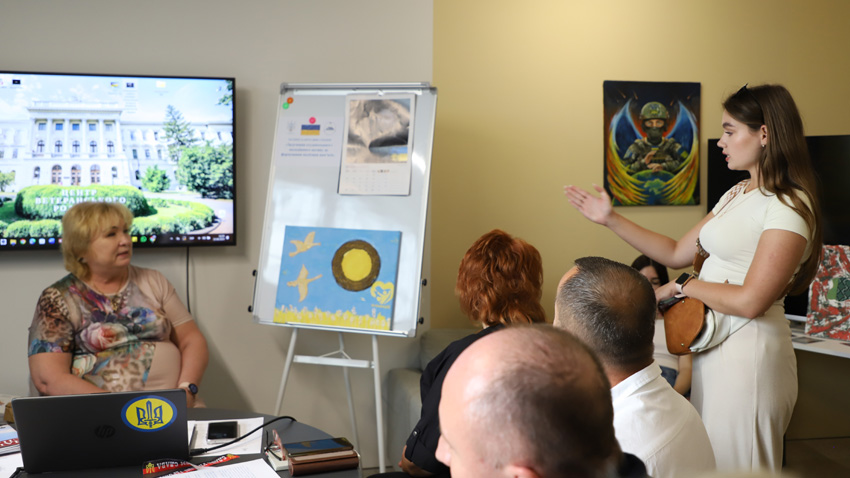The Veterans Service Center at Lviv Polytechnic National University hosted a roundtable discussion on the involvement of students and youth in shaping memory policy. The event brought together representatives of the academic community, NGOs, and international partners to discuss the role of young people in reconstructing the country after the war and activating civic engagement through understanding and preserving Ukraine’s historical heritage.
The meeting began with the national anthem and a minute of silence in memory of those who died in the Russian-Ukrainian war. Afterwards, Tetiana Shapovalova, Head of the Veteran Service Center and Associate Professor at the Department of Sociology and Social Work, the Institute of the Humanities and Social Sciences, said in her speech that the university’s duty is not only to teach students, but also to form a deep understanding of the sacrifice and heroism of previous generations.
One of the main issues discussed at the roundtable was the absence of a law on the formation of a memory policy in Ukraine, which is mandatory for all EU countries. Olha Bodnar, Head of the Culture Sector of the Stryi District State Administration, emphasised the need for clear legislative guidance on which historical objects and subjects should be preserved and how they should be passed on to future generations. An important task is to create a history that is truthful and unadulterated.
– All European Union countries have a law on memory policy, only Ukraine does not. The formation of a memory policy is very broad: what objects and subjects do we preserve, for whom do we preserve it, to whom should we pass it on? What should we do? The full-scale invasion made us understand who we are, what kind of state we are, what kind of land we walk on, what kind of cultural heritage we have. So we have to combine all this in the law on the formation of the memory policy so that we know how to do it right. Not twisted, not erased, not rewritten, but the right history to give to the young people, the children, to their hearts and to their heads, so that they understand what we are standing for today, said Olha Bodnar.
The representatives of the Kornel Makuszyński Cultural and Educational Centre of the Polish community in Stryi took part the event. They reminded the audience of the importance of cooperation in preserving cultural heritage as an element of national security.
A special highlight of the roundtable was an exhibition of children’s paintings created as part of the Good in Action project by the Young Talents of Stryi Region organisation. The drawings, made by children aged six to thirteen, reflect the symbols of Ukrainian culture and the indomitable spirit of the nation.
Children embodied their creative ideas through various crafts, creating unique paintings, including: The Ukrainian Sun Has Risen, The Butterfly of Invincibility, Motanka, Money Tree, My Embroidered Ukraine and Weeping Willow. The young artists painted not just for the sake of art, but for a great goal – to sell their works and use the proceeds to buy a drone to support Ukraine’s defenders. During the summer three times a week they worked hard on their paintings and eventually created 53 original works that reflect their aspirations. Children from Stryi district took part in this project, including Anna Maksymovych, Diana Yatsyk, Anhelina Vasyliv, Anna Kush, Viktoria Stadnyshyn, Yana Snihur and Uliana Hamalii.
One of the topics discussed at the roundtable was plans for the future. Tetiana Shapovalova suggested creating a student veterans association that would be actively involved in reconstructing the country and shaping the memory policy.
– I have an idea to unite all our student veterans and create an association of veterans at the university in order to rebuild everything together with them, because only they know better than us what veterans need and what kind of memory policy should be formed, said Tetiana Shapovalova, Head of the Veterans Service Center.
Lidiia Sozanska, the mother of the fallen student hero, also shared her expectations for the formation of a memory policy:
– The topic of memory is the most important now, because a nation that does not know its past is not worthy of its future, as the past is our history, which is created by people. History should be alive, children should see and touch the things that created this history.
